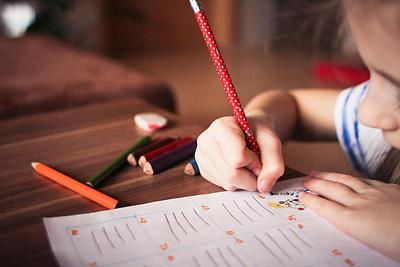Looking for all Articles by Caitrin Armstrong?
Top tips for creative writing with your kids
Our Head of Writing Communities, Caitrin Armstrong, shares a few of her favourite resources for running creative writing sessions with your children during lockdown and beyond

I’ve been lucky enough to attend lots of creative writing sessions in schools run by professional writers. No two are the same, and it’s always fascinating to see the different approaches they take. But any time I talk to writers about what works best in the classroom, there are some things which come up a lot. Nearly all of them say one thing: the sessions which are most successful are the ones where teachers get involved instead of marking at the back of the class.
Recreating the magic of an author visit in your own home is tough, particularly when you have limited time, but it is possible to have some fun with creative writing together and by giving it a shot yourself you have the opportunity to ‘model’ the process of writing.
Worried that you’re not any good at it? Actually that’s sort of the point. Stories don’t emerge from anyone perfectly formed; we all have to keep trying in order to improve. The writing process doesn’t necessarily get easier for professional writers, it’s engaging with it that matters.
Professional input does make a difference and Scottish Book Trust has lots of resources created by professionals which can help, including Authors Live(this link will open in a new window) as well as our creative writing resources(this link will open in a new window) for young people and adults.
With these at your disposal running your own creative writing session needn’t be hard. Here are a few tips:
Create time
Choose a regular time if you can. We like Cornelia Funke’s Free Writing Friday(this link will open in a new window). We spend an hour, although probably only half of this is really spent on writing, the rest is for grabbing crayons and reading work out to each other. If your child is older and you have a bit more time available you might enjoy longer sessions. Equally, shorter but more regular sessions could actually be more productive. Think about what works best for you and your family and try it out.
Create a space
A lot of the kids we’ve worked with have said that creating a space to write which feels different to a classroom is important to them. For those of us at home we might want to move away from the place we’ve been doing schoolwork. If you have enough time and space, you could try creating a writing den. If you are able to go outside a change of scenery can also help. We have limited time and just sit on the couch with a snack and a blanket.
Writer’s notebook
Many writers will tell you that the most important tool they have is their notebook. If you can provide one of these it’s a fantastic way to let kids generate ideas. This absolutely must not be used for schoolwork and you should never check punctuation or spelling.
If you haven’t got access to this at the moment then don’t worry, kids are resourceful and will make use of anything they can. A whiteboard, scraps of wallpaper or even the back of a cereal packet will do.
Write something
I am interested in children’s writing and have been working on a children’s story about my daughter and some of her friends as I know she really misses them. She also creates stories about her friends. As she can’t write that many words yet, she tells most of these stories in pictures. We have been using the story cubes from our Read Write Count bag to help her generate ideas. A lot of her stories are heavily influenced by computer games. At the end of the hour we read our stories back to each other. I am careful not to tell my daughter how bad my story is (it’s terrible) as I don’t think that’s helpful. I do however show her how I go back to make improvements after reading it out. We often re-read the improved version so that she sees the difference editing makes. I will never have a more appreciative audience.
Don’t aim for perfection
A lot of people give up on writing because they have a romantic idea of what it should be like to write. Idyllic isn’t a realistic expectation at the best of times, and definitely not if you have children. The majority of things that are really worth doing will be chaotic and a bit scary at times. This is equally true of raising children and writing.
Don’t beat yourself up
Lockdown with kids at home can be hard. If this isn’t for you, don’t worry. Read, tell your kids stories, chat to them, sing songs and encourage them to play. These are all proven ways of developing language and creativity. Everyone has different skills they can pass on; we are all just doing the best we can.